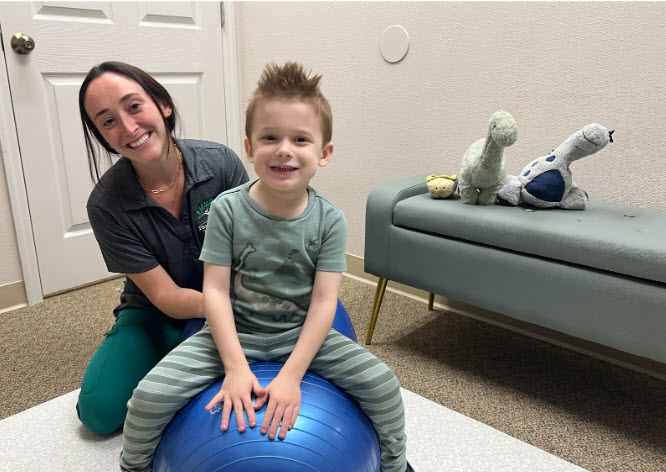Pediatric Pelvic Health Therapy
Pelvic Health Therapy: A Holistic Approach to Your Child’s Development
Pelvic health therapy within occupational therapy offers a comprehensive and personalized approach to your child’s wellness. By addressing not only physical but also sensory, emotional, and lifestyle factors, our 12-16 week program empowers children and their families with the knowledge and tools needed for lasting success—without unnecessary time or expense.

What Can You Expect?
Our program begins with a thorough assessment of your child’s needs, including:
- Developmental and health history
- Gross motor skills, strength, and flexibility
- Coordination
- Sensory processing
- Psychosocial well-being
- Breathing patterns
- Nutritional intake
The program structure includes:
- 1 Evaluation -> 11 Therapy Sessions -> 4 Follow-up Sessions
- Total Sessions: 16
Our approach focuses on building a strong foundation for your child’s health through:
- A customized home exercise plan tailored to your child’s unique needs
- Education on digestive and bodily processes to increase body awareness
- Body mechanics training to improve posture and movement patterns
- Breathing techniques for relaxation and engagement of the pelvic floor muscles to aid in toileting and digestion
- Confidence-building activities that encourage self-awareness and self-efficacy
Therapy sessions may include specialized techniques such as:
- Electrical stimulation (e-stim) for muscle activation
- Fascial release to improve mobility and comfort
- Biofeedback to help your child understand and regulate their body’s responses
- Strength training to enhance core stability and endurance
- Whole body vibration to improve muscle activation and sensory input
Our program combines education with fun, interactive learning tools such as:
- Handouts and videos for at-home reinforcement
- Hands-on learning and group discussions for better understanding
- Technology-based tools and apps to track progress and make exercises engaging
Total Program Cost: Approximately $2,400 (subject to slight adjustments based on individual needs)
- Includes: 1 (60-minute) evaluation + 11 weekly (60-minute) therapy sessions + 4 follow-up 30-minute sessions
- Deposit Requirement: A 30% deposit is required to reserve a slot, the balance is due at the first session.
What Happens After the Program?
After completing the 12-16 week program, your child will have the tools and confidence to continue progress at home. Our approach ensures families feel empowered rather than reliant on continuous therapy, making the investment in care both effective and efficient.
Our goal is to create a supportive, family-centered approach to improve your child’s body awareness, self-regulation, and overall development. Contact us today to learn how this program can support your child’s growth and independence.
What Our Families Are Saying
"Our son has struggled with stool withholding and fear of pooping since he was 1.5 years ago. Doctors kept dismissing our concerns about low muscle tone so we exhausted so many options with very little success before considering occupational therapy.
Fast forward 2 years later, our son had endured laxatives, multiple supplements (which caused diarrhea and dehydration) and suppositories when all else failed. We saw two different GI doctors, worked closely with a dietician, homeopathic doctor and sought chiropractic care with very little to no improvement.
After searching for pelvic floor therapy in our area we came across Family First Therapy and started to see Meagan. She is a miracle worker! Our son quickly saw improvement in muscle tone, core and pelvic strength and gained incredible confidence within himself. In just a few short weeks, all medications were stoped and he was pooping on the toilet naturally. Meagan is so fun and encouraging and our son looks forward to working with her. We are so thankful for her and Family First Therapy and can't thank them enough for their loving, compassionate care."
"We are so glad we tried pelvic floor OT for our daughter! Our daughter struggled with constipation for YEARS. We saw specialists and believed Miralax and diet were the only options, but not seeing any improvements.
What we have learned has been invaluable. Our daughter had some muscle weakness areas that were impacting her ability to be successful with the bathroom. We has learned great exercises and tools that have also helped her overcome the emotional toll this has had on her. She is more confident in herself and we are working our way off Miralax! We are so thankful for Family First and the knowledge of our OT Meagan!"
"We started going to Family First therapy after a year and a half long battle of trying to get our son to poop on the toilet. We tried every possible option imaginable at home and were so discouraged, because at this point he was 5, and about to start kindergarten. Family First Therapy was highly recommended by close family friends and it was the best decision we ever made to go there, and wish it was a choice we had made much sooner.
We started in April of 2024 and saw Ms. Megan, who specializes in pelvic floor therapy and she was absolutely phenomenal. Our son had a lot of anxiety when it came to using the bathroom and she was able to work through his concerns and fears, and managed to get him to overcome some of the biggest obstacles. By August of 2024, our son reached the end goal and can now use the bathroom 100%. Ms. Megan was amazing in every aspect and offered so much encouragement even between sessions if there was a day that had more struggles than not. Family First Therapy will forever have our gratitude and is the number one place we will always recommend."
